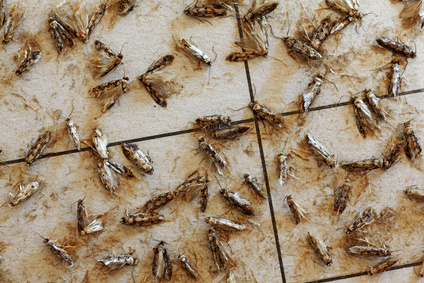Moth Pest Control & Advice
Predator Pest Solutions are specialists in treating moth infestations. If you would like a free no obligation quote, please call us on 0800 112 3480 or fill in the form on the right.
Information On Moths
The most common moth species in the UK are the Common Clothes moth, the Case Bearing Clothes moth, the Brown House moth and the White Shouldered House moth. Their larvae are commonly found in bird nests, so if you have had birds roosting or nesting on your property, this could be a direct source of any infestation. Moths feed on Keratin which is found in natural fibres such as wool, feathers, hair and nails and are particularly drawn to bright lights and dirty fabrics or carpets.

Moths are common to the UK and although mainly an issue during the summer months, given our warm, centrally heated houses, they can live in our homes throughout the year. There are four life stages of the moth: egg, larvae, pupae and adult. The eggs are a whitish colour and normally hatch into larvae within a few weeks. The moth lays her eggs in dark and rarely disturbed areas of our homes, such as clothes cupboards, spare rooms and under beds. Once hatched the larvae begin to feed continuously until they pupate and emerge as an adult moth.
The adult moth is similar to a butterfly, but they are mostly a dull brown or cream colour and generally less distinctive than their butterfly cousins. Their larvae are translucent or white in colour, but this can change depending on their food.
Moth Infestations & Risks
Moths occur naturally outdoors and fly freely in the summer months from flower to flower, feeding on pollen and decaying fruits. It is their eggs, larvae and pupae which create the main pest problems within our homes and offices. The first sign of any infestation may be when you observe damage to your clothes, fabrics, furs, leathers and carpets. Look out for any adult moths, small pin-prick type holes in your clothing, bald patches on carpets/rugs, maggot like larvae, silken tubes, cases, or cocoons.
Moths do not present any significant health risk to pets or humans; the greatest risk is the damage their larvae can cause to your belongings.
Moth Pest Control
The treatment for your property is normally by the use of a HSE approved insecticide spray or lure traps. This should be applied around the affected and adjoining areas, driving the moths from their hiding places and killing off the infestation. All our moth treatments are HSE approved and it is safe to return to and use the rooms that have been treated after a few hours. If you have pets, keep them out of the affected area for at least 24 hours.
In most situations it normally takes up to 60 minutes for our technician to complete their risk assessment, the required treatment and to brief the customer on the actions taken and next steps, but this can be extended if the infestation is in numerous areas or other hazardous conditions exist. The areas treated should not be cleaned of vacuumed for 14 days.
Once completed, the infestation should start to die off, but our technician can return after 14 days if the infestation requires a further visit to your property. Some moth infestations, especially those in commercial or multi-occupancy buildings may require additional visits to eradicate all activity.
If you have a moth infestation:
- Regularly inspect airing cupboards, wardrobes and spare rooms for any moth activity.
- Ensure you do not have any birds roosting on your property and destroy any nests.
- Check for old wool based insulation or lagging and replace with modern equivalents.
- The fitting of a fly screen can prevent moths entering an open door or window at night.
- Always clean clothes and fabrics before storing them away in suitcases or sealed vacuum packed bags.
- Regularly shampoo or spray your carpets and sofa’s etc with a suitable cleaning product or disinfectant.
- Hot wash or dry clean any bedding, curtains or clothing that has come into contact with the infestation.
- Carefully check, clean & clear the rooms of any other personal or valuable belongings before storing them away.
- Vacuum and clean all affected areas, then throw the waste away in an external bin.
- Ensure the edges of the rooms and any storage areas to be treated are accessible.
- Call Predator Pest Solutions on Freephone 0800 112 3480.
On arrival, our technician will:
- Establish the species, location and size of the moth infestation.
- Determine the most appropriate method of treatment.
- Brief the customer on their findings and recommended next steps.
- Ensure the safety of others & protect any food preparation areas.
- Wear their protective equipment and commence with the treatment.
- Determining the correct and optimum locations for any surface insecticide and deploy with minimum impact to the customer.
- If required, implement a regular monitoring regime and maintain a site plan of the locations treated.
- Ensure the area is left safe and provide a written report.














